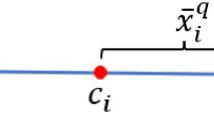Abstract
Under the retailing environment, shelf space-based competition between items with different brands has drawn much attention from practitioners and researchers, the decision for low-temperature stored items on limited shelf spaces are compounding this challenge. This paper discusses the shelf display space partition assignment decision for low-temperature dairy items with two-phase demand in remaining shelf-life to maximize the profit of the shelf. Two-phase demand is assumed for the first time based on the knowledge that consumers’ perception on the quality of the dairy item is unequal to its true shelf-life. Moreover, considering shelf partitions in different heights carry different sale gaining potentials, three profit weights are given to the partitions. Herein, a new research model named as SPSPA of shelf profit space partition assignment for the low-temperature stored dairy items is constructed. To effectively solve the proposed SPSPA, a hybrid firefly particle swarm optimization (HFPSO) is developed combing the superiority of particle swarm optimization (PSO) in coarse search and firefly algorithm (FA) in fine search. Numerical experiments have been performed on small- and large-scale cases to verify the performance of the proposed HFPSO algorithm by comparing with genetic algorithm, differential evolution (DE), PSO, and FA based on which management insights are obtained for the shelf space assignment decision.




Similar content being viewed by others
Data Availability
Enquiries about data availability should be directed to the authors.
References
Akkaş A (2019) Shelf space selection to control product expiration. Product Oper Manage 28(9):2184–2201. https://doi.org/10.1111/poms.13034
Aydilek İbrahim Berkan (2018) A hybrid firefly and particle swarm optimization algorithm for computationally expensive numerical problems. Appl Soft Comput 66:232–249. https://doi.org/10.1016/j.asoc.2018.02.025
Bai R, Kendall G (2008) A model for fresh produce shelf-space allocation and inventory management with freshness-condition-dependent demand. INFORMS J Comput 20(1):78–85. https://doi.org/10.1287/ijoc.1070.0219
Bai R, Burke EK, Kendall G (2008) Heuristic, meta-heuristic and hyper-heuristic approaches for fresh produce inventory control and shelf space allocation. J Oper Res Soc 59(10):1387–1397. https://doi.org/10.1057/palgrave.jors.2602463
Bai R, van Woensel T, Kendall G, Burke EK (2013) A new model and a hyper-heuristic approach for two-dimensional shelf space allocation. A Q J Oper Res 11(1):31–55. https://doi.org/10.1007/s10288-012-0211-2
Banerjee S, Agrawal S (2017) Inventory model for deteriorating items with freshness and price dependent demand: optimal discounting and ordering policies. Appl Math Model 52:53–64. https://doi.org/10.1016/j.apm.2017.07.020
Bianchi-Aguiar T, Hübner A, Carravilla MA, Oliveira JF (2021) Retail shelf space planning problems: a comprehensive review and classification framework. Eur J Oper Res 289(1):1–16. https://doi.org/10.1016/j.ejor.2020.06.018
Bultez A, Naert P (1988) SH.A.R.P.: Shelf allocation for retailers’ profit. Market Sci 7(3), 211–231 https://doi.org/10.1287/mksc.7.3.211
Chan CK, Cheung BK-S, Langevin A (2003) Solving the multi-buyer joint replenishment problem with a modified genetic algorithm. Transp Res Part B: Methodol 37(3):291–299. https://doi.org/10.1016/S0191-2615(02)00015-2
Chandon P, Hutchinson JW, Bradlow ET, Young SH (2009) Does in-store marketing work? Effects of the number and position of shelf facings on brand attention and evaluation at the point of purchase. J Market 73(6):1–17. https://doi.org/10.1509/jmkg.73.6.1
Chen M-C, Lin C-P (2007) A data mining approach to product assortment and shelf space allocation. Expert Syst Appl 32(4):976–986. https://doi.org/10.1016/j.eswa.2006.02.001
Chen Y-L, Chen J-M, Tung C-W (2006) A data mining approach for retail knowledge discovery with consideration of the effect of shelf-space adjacency on sales. Decis Support Syst 42(3):1503–1520. https://doi.org/10.1016/j.dss.2005.12.004
Chen S-C, Min J, Teng J-T, Li F (2016) Inventory and shelf-space optimization for fresh produce with expiration date under freshness-and-stock-dependent demand rate. J Oper Res Soc 67(6):884–896. https://doi.org/10.1057/jors.2015.100
Cui L, Deng J, Liu F, Zhang Y, Xu M (2017) Investigation of RFID investment in a single retailer two-supplier supply chain with random demand to decrease inventory inaccuracy. J Clean Prod 142:2028–2044. https://doi.org/10.1016/j.jclepro.2016.11.081
Cui L, Deng J, Zhang Y, Zhang Z, Xu M (2020) The bare-bones differential evolutionary for stochastic joint replenishment with random number of imperfect items. Knowl-Based Syst 193:105416. https://doi.org/10.1016/j.knosys.2019.105416
de Vasconcelos Segundo EH, Amoroso AL, Mariani VC, dos Santos CL (2017) Economic optimization design for shell-and-tube heat exchangers by a Tsallis differential evolution. Appl Therm Eng 111:143–151. https://doi.org/10.1016/j.applthermaleng.2016.09.032
Eisend M (2014) Shelf space elasticity: a meta-analysis. J Retail 90(2):168–181
Entrup ML, Günther HO, Beek PV, Grunow M, Seiler T (2005) Mixed-integer linear programming approaches to shelf-life-integrated planning and scheduling in yoghurt production. Int J Prod Res 43(23):5071–5100. https://doi.org/10.1080/00207540500161068
Eroglu C, Williams BD, Waller MA (2013) The backroom effect in retail operations. Product Oper Manage 22(4):915–923. https://doi.org/10.1111/j.1937-5956.2012.01393.x
Gharbi A, Kenné J-P, Kaddachi R (2022) Dynamic optimal control and simulation for unreliable manufacturing systems under perishable product and shelf life variability. Int J Prod Econ 247:108417. https://doi.org/10.1016/j.ijpe.2022.108417
Golchi MM, Saraeian S, Heydari M (2019) A hybrid of firefly and improved particle swarm optimization algorithms for load balancing in cloud environments: Performance evaluation. Comput Netw 162:106860. https://doi.org/10.1016/j.comnet.2019.106860
Gümüşçü A, Kaya S, Tenekeci ME, Karaçizmeli İH, Aydilek İB (2021) The impact of local search strategies on chaotic hybrid firefly particle swarm optimization algorithm in flow-shop scheduling. J King Saud Univ Comput Inf Sci. https://doi.org/10.1016/j.jksuci.2021.07.017
Hariga MA, Al-Ahmari A, Mohamed A-RA (2007) A joint optimisation model for inventory replenishment, product assortment, shelf space and display area allocation decisions. Eur J Oper Res 181(1):239–251. https://doi.org/10.1016/j.ejor.2006.06.025
Huang H, Yao L, Chang J-S, Tsai C-Y, Kuo RJ (2019) Using product network analysis to optimize product-to-shelf assignment problems. Appl Sci. https://doi.org/10.3390/app9081581
Hwang H, Choi B, Lee M-J (2005) A model for shelf space allocation and inventory control considering location and inventory level effects on demand. Int J Prod Econ 97(2):185–195. https://doi.org/10.1016/j.ijpe.2004.07.003
Hwang H, Choi B, Lee G (2009) A genetic algorithm approach to an integrated problem of shelf space design and item allocation. Comput Indus Eng 56(3), 809–820. https://doi.org/10.1016/j.cie.2008.09.012. Intelligent manufacturing and logistics
Karki U, Guthrie B, Parikh PJ (2021) Joint determination of rack configuration and shelf space allocation for a retailer. Int J Prod Econ 234:107943. https://doi.org/10.1016/j.ijpe.2020.107943
Kennedy J (2010) In: Sammut C, Webb G.I. (eds.) Particle swarm optimization, pp. 760–766. Springer, Boston. https://doi.org/10.1007/978-0-387-30164-8_630
Kim G, Moon I (2021) Integrated planning for product selection, shelf-space allocation, and replenishment decision with elasticity and positioning effects. J Retail Consum Serv 58:102274. https://doi.org/10.1016/j.jretconser.2020.102274
Kora P, Rama Krishna KS (2016) Hybrid firefly and particle swarm optimization algorithm for the detection of bundle branch block. Int J Cardiovasc Acad 2(1):44–48. https://doi.org/10.1016/j.ijcac.2015.12.001
Maihami R, Nakhai KI (2012) Joint pricing and inventory control for non-instantaneous deteriorating items with partial backlogging and time and price dependent demand. Int J Prod Econ 136(1):116–122. https://doi.org/10.1016/j.ijpe.2011.09.020
Murray CC, Talukdar D, Gosavi A (2010) Joint optimization of product price, display orientation and shelf-space allocation in retail category management. J Retail 86(2):125–136. https://doi.org/10.1016/j.jretai.2010.02.008. Special issue: modeling retail phenomena
Nafari M, Shahrabi J (2010) A temporal data mining approach for shelf-space allocation with consideration of product price. Expert Syst Appl 37(6):4066–4072. https://doi.org/10.1016/j.eswa.2009.11.045
Olsen AL (2005) An evolutionary algorithm to solve the joint replenishment problem using direct grouping. Comput Ind Eng 48(2):223–235. https://doi.org/10.1016/j.cie.2005.01.010
Önal M, Yenipazarli A, Kundakcioglu OE (2016) A mathematical model for perishable products with price- and displayed-stock-dependent demand. Comput Ind Eng 102:246–258. https://doi.org/10.1016/j.cie.2016.11.002
Ostermeier M, Düsterhöft T, Hübner A (2021) A model and solution approach for store-wide shelf space allocation. Omega 102:102425. https://doi.org/10.1016/j.omega.2021.102425
Piramuthu S, Zhou W (2013) RFID and perishable inventory management with shelf-space and freshness dependent demand. Int J Prod Econ 144(2):635–640. https://doi.org/10.1016/j.ijpe.2013.04.035
Satiti D, Rusdiansyah A, Dewi RS (2020) Modified EOQ model for refrigerated display’s shelf-space allocation problem. IOP Conf Ser Mater Sci Eng 722(1):012014. https://doi.org/10.1088/1757-899x/722/1/012014
Shi Y, Liu H, Gao L, Zhang G (2011) Cellular particle swarm optimization. Inf Sci 181(20):4460–4493. https://doi.org/10.1016/j.ins.2010.05.025. Special Issue on Interpretable Fuzzy Systems
Soni HN, Patel KA (2013) Joint pricing and replenishment policies for non-instantaneous deteriorating items with imprecise deterioration free time and credibility constraint. Comput Ind Eng 66(4):944–951. https://doi.org/10.1016/j.cie.2013.08.022
Teng J-T, Chang C-T (2005) Economic production quantity models for deteriorating items with price- and stock-dependent demand. Comput Oper Res 32(2):297–308. https://doi.org/10.1016/S0305-0548(03)00237-5
Timonina-Farkas A, Katsifou A, Seifert RW (2020) Product assortment and space allocation strategies to attract loyal and non-loyal customers. Eur J Oper Res 285(3):1058–1076. https://doi.org/10.1016/j.ejor.2020.02.019
Valenzuela A, Raghubir P, Mitakakis C.: Shelf space schemas: Myth or reality? J Bus Res 66(7), 881–888 (2013). https://doi.org/10.1016/j.jbusres.2011.12.006. Scientific advancements in consumer-retailer relationships internationalization of marketing communication and consumer research
Wu K-S, Ouyang L-Y, Yang C-T (2006) An optimal replenishment policy for non-instantaneous deteriorating items with stock-dependent demand and partial backlogging. Int J Prod Econ 101(2):369–384. https://doi.org/10.1016/j.ijpe.2005.01.010
Wu K-S, Ouyang L-Y, Yang C (2009) Coordinating replenishment and pricing policies for non-instantaneous deteriorating items with price-sensitive demand. Int J Syst Sci 40:1273–1281
Yang X-S (2010) Firefly algorithm, stochastic test functions and design optimisation. Inte J Bio-Inspired Comput 2(2):78–84. https://doi.org/10.1504/IJBIC.2010.032124
Zelinka I, Diep QB, Snášel V, Das S, Innocenti G, Tesi A, Schoen F, Kuznetsov NV (2022) Impact of chaotic dynamics on the performance of metaheuristic optimization algorithms: an experimental analysis. Inf Sci 587:692–719. https://doi.org/10.1016/j.ins.2021.10.076
Zhao J, Zhou Y-W, Wahab MIM (2016) Joint optimization models for shelf display and inventory control considering the impact of spatial relationship on demand. Eur J Oper Res 255(3):797–808. https://doi.org/10.1016/j.ejor.2016.05.025
Acknowledgements
This research is partially supported by National Natural Science Foundation of China (72172022), Humanities and Social Sciences Foundation of the Chinese Ministry of Education (21YJC630016), Scientific and Technological Research Program of Chongqing Municipal Education Commission (KJQN202200749), and Open Fund of Chongqing Intelligent Supply Chain Engineering and Technology Research Center (OFCISCETRC23203).
Funding
The authors have not disclosed any funding.
Author information
Authors and Affiliations
Corresponding authors
Ethics declarations
Conflict of interest
The authors declare that they have no conflict of interest.
Ethical approval
This article does not contain any studies with human participants or animals performed by any of the authors.
Additional information
Publisher's Note
Springer Nature remains neutral with regard to jurisdictional claims in published maps and institutional affiliations.
Rights and permissions
Springer Nature or its licensor (e.g. a society or other partner) holds exclusive rights to this article under a publishing agreement with the author(s) or other rightsholder(s); author self-archiving of the accepted manuscript version of this article is solely governed by the terms of such publishing agreement and applicable law.
About this article
Cite this article
Cui, L., Wang, J., Li, S. et al. A hybrid firefly particle swarm for low-temperature dairy items assignment considering shelf display space profit disparities and two-phase demand. Soft Comput 27, 17971–17989 (2023). https://doi.org/10.1007/s00500-023-09005-y
Accepted:
Published:
Issue Date:
DOI: https://doi.org/10.1007/s00500-023-09005-y




